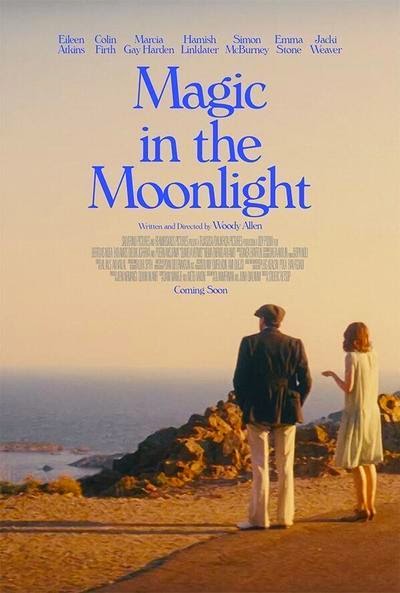Magic in the Moonlight - a review and a slight digression on love
To
enjoy a Woody Allen film after an honest day’s work is a fine way to whittle away an
evening. From the familiar font of the opening credits to the first cords of
Cole Porter, the unmistakeable stamp of the little genius suffused through the
cinema.
Magic
in the Moonlight bears all the hallmarks of Allen films of late: beautiful
scenery (set in Provence in the golden 20’s) bathed in golden light, attractive
characters with distinct personalities, witty conversation and existentialist quarrels.
The
story unfolds around Stanley (Colin Firth), a misanthropic, egotistical, cynical,
sarcastic and world famous magician. He is beseeched by a friend to unmask
Sophie Baker (Emma Stone), an American clairvoyant who has established herself
with a gullible and wealthy family.
Essentially, the film is a story of an emotionally arid middle-aged man whose passions are unwittingly
and grudgingly rejuvenated by the wellspring of beauty, youth and mystique of
the wondrous. In other words, it is the battle between cynicism and romanticism,
with both factions starting from their respective extreme ends and meeting
somewhere in the middle. Hence, it can be seen as a metaphorically
autobiographical film for the director – the aging artist reinvigorated by
youth (Allen’s own rather sordid household arrangement with his former adopted
daughter may be a bit of a stretch even for an eccentric artiste) and the two
sides of his nature, the incurable romantic versus the ironic, wry, atheist Jewish
comic.
Colin
Firth was curiously flat in the first third but picks up marvelously. It takes
great subtlety and comic timing to portray well the adorable disorder of dignity
gone awry. His slightly cheesy, slightly self-conscious and slightly self-deprecating
grin and eyes imbued with sensibility takes the edge off of Stanley’s crusty
and caustic personality and makes him appear vulnerable, which is an essential characteristic in a
comic role. Especially pertinent was this when he talks to his aunt, his proxy mother, played in a
delightful minor key by Eileen Atkins.
The
doe-eyed Emma Stone was fantastically cast. There is a refreshing lack of
pretension in her acting, something rare in the new wave of young actors. Her charms, helped by her alarmingly large and limpid eyes, come across with a innocence and openness that counterbalances her role as the mountebank. Her
slightly exaggerated moments whilst ‘under’ is a joke both at the expense of
the spiritualists and a breaching of the forth wall and a wink to the audience. Whilst
sharing great chemistry, the two emanated not so much eros but agape. They would have
made a great father and daughter. An element of reverse Pygmalion also abounds,
where instead of the man of the world making a lady out of the Cockney flower
girl, it is the American charlatan who rekindles the fire of passion in the
middle-aged artist.
The
central message seems to be that despite the disingenuousness and ultimate disappointment
of spiritualism and the occult; the supposedly open-minded, spiritual and romantic but in fact empty and vapid pursuits, the world is not without wonder and the numinous.
Love is what provides magic in the mundane world and brings colour to a
colourless palette. More to be felt than be defined, love nevertheless lured
many great artists to try. Emily Dickinson summed it up with ‘Love is all we
need and that’s all we need to know of love’, sometimes ineffectually shortened
to ‘all we need is love’. Yeats wrote in his drinking song, ‘Wine comes in at
the mouth/ And love comes in at the eyes;/ That’s all we shall know for
truth/Before we grow old and dies’. Both writers confirming the ineffability of
the great motivator. Perhaps Oscar Wilde sums it up best by observing that ‘The
very essence of romance is uncertainty’.



Comments
Post a Comment